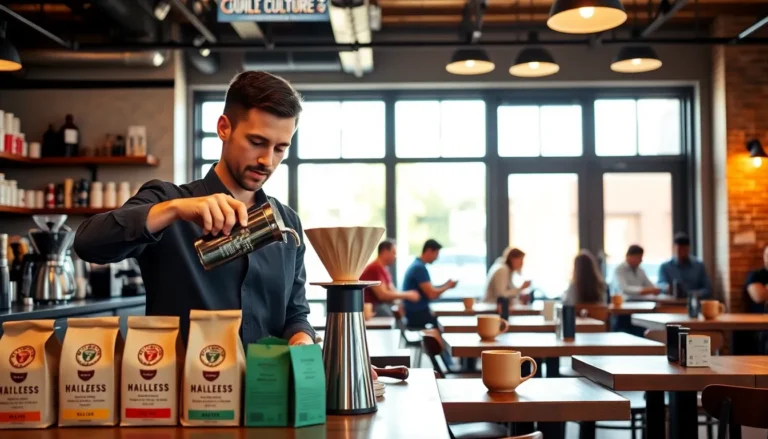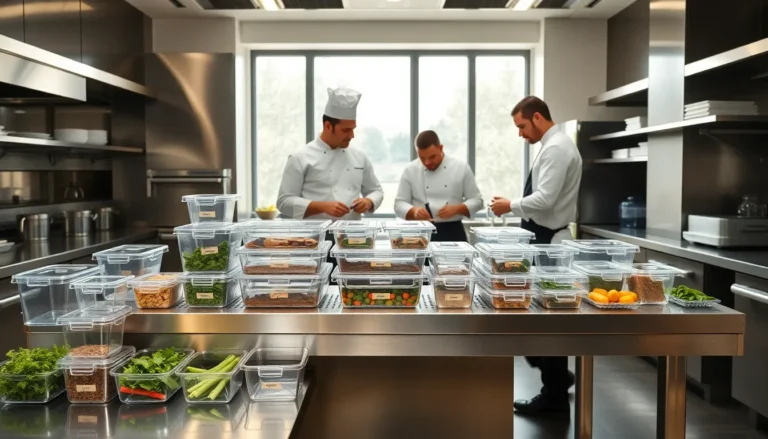In a world where food is more than just sustenance, food reviewers are the culinary adventurers guiding taste buds through a delicious landscape. They don’t just eat; they embark on flavor quests, armed with a fork in one hand and a notepad in the other. With every bite, they uncover hidden gems and culinary catastrophes, all while keeping their sense of humor intact.
Imagine someone who can turn a simple meal into an epic tale, complete with dramatic pauses and witty commentary. That’s the magic of a food reviewer. They bring dishes to life, turning mundane menus into mouthwatering masterpieces. Whether it’s a trendy food truck or a five-star restaurant, food reviewers dive deep, ensuring you never waste a meal again. Join the journey as they share their insights and keep your dining experiences both delightful and entertaining.
Table of Contents
ToggleWhat Is a Food Reviewer?
A food reviewer evaluates restaurants, dishes, and culinary experiences. Many food reviewers operate through blogs, social media, and review platforms, sharing their thoughts with a broad audience. Their primary goal lies in providing honest assessments that inform and guide diners.
Engagement with various cuisines defines a food reviewer’s journey. They taste and critique food, focusing on flavors, presentation, and overall enjoyment. Constructive criticism helps elevate culinary standards, encouraging chefs to innovate and improve.
Reviews often emphasize personal experiences, allowing diners to connect with the story behind each dish. For instance, a food reviewer might detail a savory paella, describing the seafood’s freshness and the rich saffron aroma. Such insights create an immersive narrative that enhances the reader’s anticipation and connection to the meal.
Trustworthiness plays a crucial role in the relationship between food reviewers and their audience. Many readers rely on reviews to discover new dining options and hidden gems. Consistent honesty cultivates credibility, making it essential for reviewers to voice genuine opinions rather than veiling them in exaggeration.
Each review contributes to a larger culinary tapestry, weaving together diverse food experiences. By sharing both positive and negative encounters, food reviewers enrich the dining landscape, enabling diners to make informed choices. Whether through traditional print, online platforms, or social media, the impact of a food reviewer resonates far beyond a simple rating.
The Role of a Food Reviewer

Food reviewers serve as essential guides in the culinary landscape, assisting diners with comprehensive evaluations of their dining experiences.
Evaluating Taste and Quality
Taste and quality form the cornerstone of any food review. Reviewers assess flavors, texture, and freshness when sampling dishes. Ingredients used also play a significant role. For instance, fresh herbs enhance the taste of a dish. It’s vital to articulate how well the flavors complement each other. A reviewer might note how a rich sauce elevates grilled meat. Honest opinions regarding quality influence diners’ choices. By consistently offering detailed appraisals, reviewers help promote high culinary standards across restaurants. The authenticity of each review allows consumers to make educated dining decisions, fostering trust between the reviewer and their audience.
Analyzing Presentation and Ambiance
Presentation and ambiance contribute significantly to a dining experience. The visual appeal of a dish can capture one’s attention even before tasting. Reviewers examine plating techniques, color contrasts, and portion sizes. An artistically arranged dish often enhances enjoyment. Ambiance, including decor, lighting, and overall vibe, also deserves attention. A cozy, inviting atmosphere can elevate a meal significantly. Noise levels and service quality impact diners’ perceptions as well. By evaluating these elements, food reviewers provide a holistic view of what a diner can expect. Their insights not only enrich the reviews but create a more enjoyable dining experience overall.
Skills Required to Be a Food Reviewer
Food reviewers rely on a set of essential skills to evaluate culinary experiences effectively. These abilities enhance their insights and enrich their narratives.
Writing Skills
Strong writing skills form the foundation of effective food reviewing. Descriptive language captivates readers, allowing them to visualize and savor a meal through words. Clarity in communication ensures that reviews convey accurate assessments, making it easier for diners to make informed choices. Crafting engaging stories and maintaining an enjoyable tone draw readers into personal experiences, transforming a simple review into an immersive dining adventure. Consistency in style also helps establish a reviewer’s voice, fostering trust with the audience.
Palate Development
Palate development plays a crucial role in the capabilities of a food reviewer. Refining taste perception enhances the ability to distinguish subtle flavors and textures. Training the palate includes experimenting with various cuisines and ingredients, leading to a deeper appreciation for culinary artistry. Recognizing ingredient quality, such as freshness and seasonality, allows reviewers to provide valuable feedback on dishes. Over time, a well-developed palate helps in articulating nuanced opinions, ensuring that reviews resonate with both culinary enthusiasts and casual diners.
Popular Food Reviewers in the Industry
Food reviewers shape the culinary conversation, influencing dining choices and restaurant reputations. Various personalities stand out within this vibrant community.
Influential Food Critics
Renowned food critics hold significant sway in the culinary world. Anthony Bourdain revolutionized food journalism, blending travel and cuisine with personal narratives. Ruth Reichl, another iconic figure, famously transformed the role of a food critic at The New York Times, emphasizing personal storytelling. Jonathan Gold garnered accolades for his ability to capture Los Angeles’s diverse food scene, offering insights that went beyond mere descriptions. Each critic influences chefs and restaurants with their unique voices.
Social Media Influencers
Social media has given rise to a new generation of food influencers. Platforms such as Instagram and TikTok showcase vibrant food photography and videos, captivating audiences daily. Food bloggers like Emily Mariko and influencers such as Tabitha Brown leverage their platforms to engage with followers through recipes and reviews. Influencers often provide authentic experiences, fostering connections within their communities. This dynamic presence encourages brands to adapt their culinary offerings, responding directly to consumer preferences.
Food reviewers play a vital role in shaping the culinary world. Their insights and narratives not only guide diners but also inspire chefs to elevate their craft. By sharing personal experiences and honest assessments, they create connections that enhance the dining journey.
The impact of food reviewers extends beyond mere ratings. They foster a culture of appreciation for culinary artistry while encouraging innovation within the industry. As they navigate through diverse cuisines and experiences, food reviewers enrich the culinary landscape, making dining more enjoyable and memorable for everyone.



